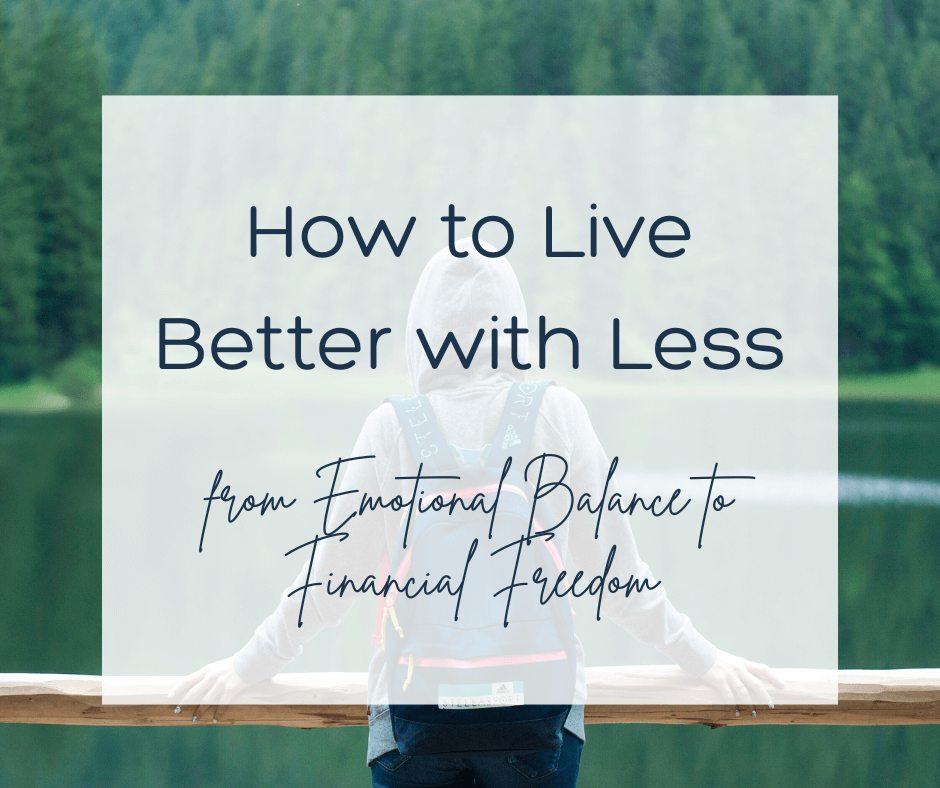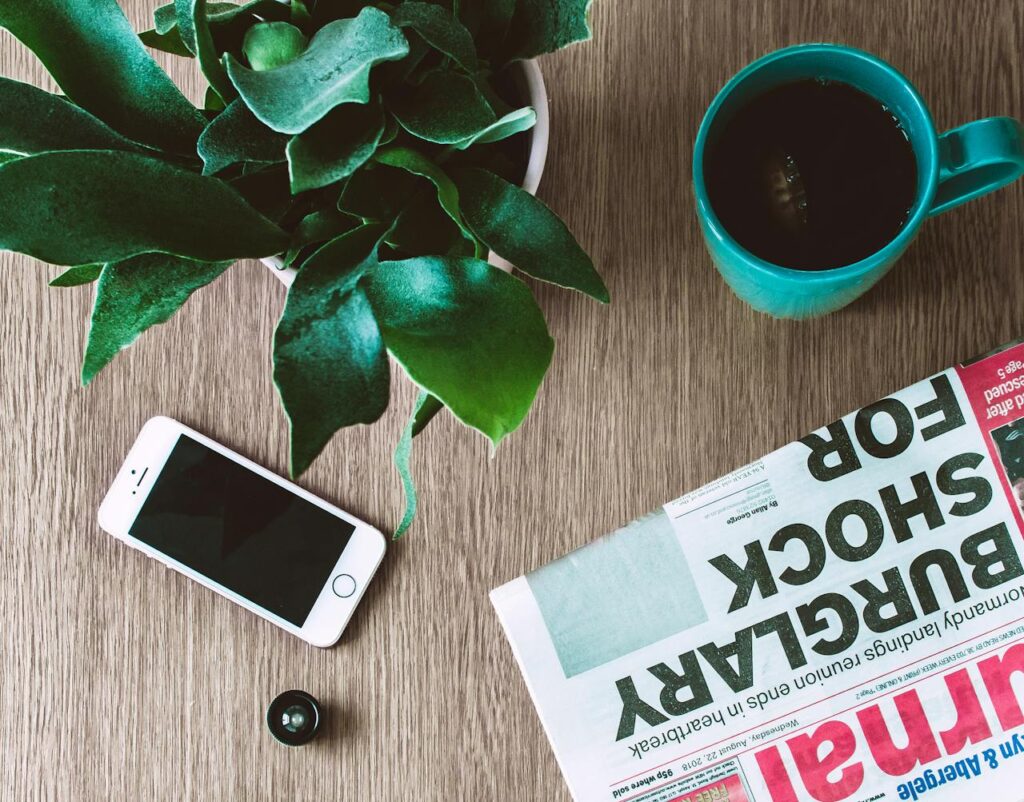To live better with less doesn’t mean deprivation, quite the opposite! Today’s overwhelming consumer culture has many of us drowning in possessions yet feeling oddly empty.
In this article, I will show you how happiness and fulfillment do not come from owning as much as possible, and I will teach you where to actually find it.

From mindset shifts to mental de-cluttering, we’ll explore practical ways to live more abundantly in a noisy and consumerist world.
Ready to experience greater freedom, clarity, and satisfaction? Let’s begin this journey together!
How Can You Live Better with Less?
When it comes to this idea, of living better with less, many people think of minimalism. And it’s true: minimalism does help to spend less, and often to have a clearer head.
However, in this article I would like to focus on changing your mindset and helping you understand that choosing the simpler life is mentally liberating. It’s not just the extra money you save when you don’t buy a certain item you probably don’t need – it’s the peace of mind you have when you’re not actively chasing material possessions to make yourself feel better.
Living better with less is not about choosing a frugal lifestyle, because I don’t think a scarcity mindset and a constant worry about money can be liberating. It’s about changing your values and learning to find fulfillment in different areas of your life.
How to Start Your Mindset Shift and Live Better with Less
So how can you live better with less? Start by letting go of the need of material things to find happiness.
Here are a few examples to better illustrate what I mean:
- You will not look better because you buy the newest cosmetic product. Work instead on accepting and loving yourself.
- You will not unwind after a stressful day by going on a shopping spree and burning through your paycheck. Focus on building a support system of friends and community where you can share your worries and feel understood.
- Having a new package show up at your house every day is not normal. Try new hobbies, learn new things and meet new people.
- No, you don’t need that very specific gadget you just saw on your Insa feed. Not every product that claims to be solving a problem is necessary. Learn to be critical with impulse buys.

The Psychology Behind Our Attachment to Things
If you are someone who consumes a lot, please don’t feel bad. No-one is judging you (or no-one should, anyway). Attachment to things and placing value on objects is very natural, and very human. And maybe not just human: I bet even your pet has a favourite toy!
Humans naturally form emotional bonds with objects that remind them of significant people, events, or places. These attachments fulfill emotional needs, such as comfort or self-confidence. Objects can often feel like an extension of our personality.
- We use clothes and accessories to express ourselves, to show that we belong to a certain group.
- Keepsakes and cherish objects remind us of happier times, like childhood toys, souvenirs, family heirlooms.
- Sometimes, early childhood experiences with caregivers shape attachment styles that influence how we connect with objects later in life. Those with insecure attachments may use objects to fill emotional voids or provide a sense of security otherwise missing in relationships.
There are many reasons we get attached to objects. And unfortunately, the advertisers are taking advantage of this natural need we have, and they are turning it against it. Make no mistake – this is a science. Companies invest a lot of money in research to figure out how to exploit our weaknesses in order to sell us stuff.
This is the first step in helping you understand that you don’t need all that stuff you are buying. Here’s how you start to change your mindset and live better with less:
If it wasn’t your idea, if you didn’t go out of your way to seek that product, you most likely don’t need it.
Re-frame Your Mindset to Restore Emotional Balance
Let’s have a look at a few of the things you can do to shift your focus from consumption to a different kind of abundance – that which will restore your emotional well-being and make you feel better about yourself.
Live Better with Less Stuff
As we already discussed, the first thing to address is material possessions. Most of us in the developed world have too much. Either:
- we hoard things to which we attach emotional value, or
- we fall prey to advertising (which is everywhere! – again, not your fault) and buy way more than we actually need to live a comfortable life.

All this clutter can be exhausting. To give you an example that’s quite close to home:
- my mother has a hard time getting rid of stuff, so her house is full of things she doesn’t even know she owns. She is constantly complaining that she doesn’t have enough space, that she feels overwhelmed by all those possessions. She would love to get rid of it, but she is completely paralyzed when she sees it all. It is genuinely cluttering her mind.
A clutter-free home is necessary for a clutter-free mind. Our environment does have an effect on our well-being and our state of mind.
So when you are looking for motivation to bring less stuff into your household, you can start here. Unless you just moved recently, chances are you already have everything you need to live a comfortable life. Everything else has the exact opposite effect.
Time Abundance
I bet time is not the first thing that comes to mind when you think about de-cluttering. But a busy schedule can also be a source of stress and can be just as detrimental as a cluttered home.
In a fast-paced world where productivity is everything, time is one of our most important resources. What you do with your time has a direct impact on your well-being.
- How much of your daily schedule consists of activities that do not serve you, or actually harm you? Do you spend more than 30 minutes a day scrolling?
- Do you accept commitments you don’t really care for and which do not benefit your personal or professional goals?
- Do you spend time with people you don’t like just out of habit?
- Do you engage in activities that aren’t good for you?
Being always on the go, without stopping to consider and analyse where you are going, is a form of emotional clutter. You can live better with less unnecessary commitment. Give yourself time to reflect, to relax and to get bored. You don’t always have to be running somewhere.
Digital Minimalism: Reduce Screen Time and Digital Clutter
Since I just mentioned scrolling, let’s take a closer look at our online activity!
Prolonged exposure to screens, particularly on social media, can lead to feelings of anxiety and depression, often exacerbated by social comparison and cyber-bullying. The constant influx of information can also lead to mental fatigue and decreased attention spans, making it difficult to focus on tasks and enjoy leisure activities.
There is also a genuine concern regarding the blue light emitted by screens, which can disrupt sleep patterns, leading to fatigue and irritability.
Not to mention that excessive screen time can reduce face-to-face social interactions, contributing to feelings of loneliness and isolation.
These are just a few reasons why a more minimalist approach when it comes to digital behaviour is essential for a better quality of life.
I wrote an entire article about how to do a digital detox, you can read it here:
Be Aware of Information Consumption
And while we are on the subject of information, it’s a great idea to reduce the amount of news you are consuming. Here’s why:
Back in the day, news was in the form of a bulletin, often at the end of the day, informing you of the main events from the last 24 hours and how that might impact you.
We are now in a place where the news is a 24-hour cycle and it’s purpose isn’t information anymore, it’s entertainment. Keeping you in front of the screens is lucrative for advertisers. And the more engaged you are, the more money they make. What’s the easiest way to keep you engaged? Make you angry.
This is how we got to this point when we constantly consume information we don’t really need and, in most cases, does not affect our life in the slightest. I’ve given up watching or following the news years ago, and – believe me – I’m not cut off from the world.
If something big happens, I find out. If something that can potentially affect my life happens, I find out. Useful information just gets to you, everything else is just noise.

Financial Freedom Through Mindful Consumption
The other benefit of a mindful lifestyle is financial: if you buy less stuff, you save more money. And who doesn’t want that, especially now?
We are currently trapped in this loop of work-and-spend: it takes more and more work to make a decent living. This makes us feel empty inside, so we buy stuff to make ourselves feel better, which requires even more money. And so on.
In fact, it’s actually very easy to get off this hamster wheel, as soon as you understand that shopping “therapy” is not a substitute for real therapy, nor is it a solution to your problems. And while it makes you feel good in the moment, the dopamine hit wears off quickly, and you are left with the empty hole.
Try to replace this with cultivating meaningful relationships, developing new hobbies that don’t require consumption, but connection. This is what really fills that void.
If you invest in experiences rather than things, you create positive outcomes not just for the present, but also for the future – by cultivating healthy and long-lasting relationships, as well as beautiful memories.
Things deteriorate and break. They are not supposed to be our friends or our emotional support. Material possessions should be tools to help us live our lives. They should serve us in our greater purposes, not be a purpose in and of themselves.
The Environmental Impact of Mindful Living
I couldn’t conclude this article without mentioning the destructive impact that over-consumption has on our environment. It is often easy to overlook: when you buy something new, it’s just a thing. A small thing. How can it have a significant impact? Except small things add up.
We sometimes think of the end life of an object and do our best to dispose of it in the most environmentally friendly manner. And that’s nice, but that is the smallest impact this object has in its lifetime.
In reality, the environmental impact of a new object starts way before it reaches you.
The materials necessary in the creation of any object need to be mined. They are then shipped to different parts of the world to be processed, assembled and packaged. The mining, manufacturing and the shipping create huge emissions of CO2.

And that’s not all: manufacturing often takes place in parts of the world where the regulations are more lax to optimise costs. Workers are poorly paid and overworked, often in dangerous conditions. It also means that the processing and the disposal of materials doesn’t meet satisfactory standards, which leads to the pollution of the surrounding environment, affecting both the health and livelihoods of local communities.
All this for a gimmicky product you don’t even need.
So next time you are on the verge of impulse buying a product that just popped up on your Insta feed, take a minute to consider whether it really is worth all this damage.
Conclusion
To live better with less you don’t have to deprive yourself. This is not about living a frugal and boring life. It’s about creating space for abundance in all the right places, finding value and joy in the meaningful things that are often overlooked, like community, hobbies, new skills, and human connection.
By intentionally choosing what we allow into our homes, schedules, and minds, we create room for what truly enhances our well-being. The goal is a life with less stress, less maintenance, and more freedom.
What small step will you take today to begin living better with less? Let me know in the comments and let’s inspire each other!


Love this post! Living with less is learning to live with content.